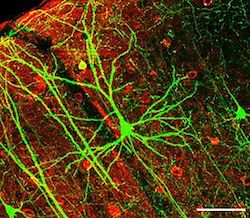What Is The Biggest Reason We Use Animals In Research?
While this tabular array is incomplete, information technology gives a brief instance of some of the reasons for why scientists and the public concord and disagree with using animals for research purposes. Below we provide a bit more than item on these positions.
Advantages to Using Animals for Enquiry

The homo body is very complicated, and many scientists believe that a living system is the all-time way to study it. Image from PLoS Biology Vol. 4, No. ii, e29.
The cells, tissues, and organs of the man torso work together in very circuitous ways. When scientists exam a enquiry question they want to examination their ideas on a system that is as much similar that of homo bodies as possible. So far, a living beast has been a better model of the human body than what other laboratory techniques can provide.
Chimpanzees and mice (and other animals, as well) do not expect very much like humans, but information technology turns out that their Dna is very similar to that of humans. This makes humans and animals biologically similar, and they tin can sometimes be affected by the same wellness problems. Scientists take reward of this similarity and use animal models to test their inquiry ideas.
Scientists too tend to piece of work with animals that take shorter life spans than humans. For example, laboratory mice may simply live for 2 to three years. In contrast, humans can live upwards of 80 to 100 years. The shorter lifespan of animals gives researchers an opportunity to written report different questions over an unabridged lifetime rather than a very pocket-size portion of it. This can help study diseases like Parkinson's, which may not develop until a person has been alive for 40 to 50 years.
Disadvantages to Using Animals for Enquiry

Some people believe that using animals, like the chimpanzee shown here, for enquiry is a bad idea because humans and other animals have different physiology. Epitome by Thomas Lersch.
Some people also believe that, even though animals have similar biological systems to humans, they still may non make skilful models for many research questions. Some studies1have reported that even subsequently doing a lot of animal research on a topic, information technology may remain difficult to use the findings of these studies in other contexts, like in a human being or other animate being.
Testing of the sleeping pill thalidomide is an example of this. It was tested on significant rats, mice, cats and republic of guinea pigs to help sleeping without whatever bad side effects. But, when administered to pregnant women, it actually had many negative effects on their children.
The opposite can besides be true. Experiments may show that a certain protocol is harmful to animals. But it may turn out to accept positive effects in humans. Aspirin is an example of this. It was shown to be dangerous to animals, but many people now find it to exist a useful medication.
Others argue that even if nosotros tin can use animals for inquiry, there are always other alternatives to employ in place of animals. These might include using computer models, cell cultures, or finding not-invasive methods that can be used on humans. Similarly, many argue that using these culling methods is cheaper than using animal models.
The Terminal Decision
There is all the same no consensus on whether it's ok to use animals in inquiry, and then scientists and the public continue to discuss and debate this topic. This has led to decisions about what animals should be used in inquiry, and likewise the institution of rules and regulations for how those animals volition be treated while in this setting.
References:
1. Jeffrey M. Perkel, "Life Science Technologies: Animal-Complimentary Toxicology: Sometimes, in Vitro is Better," sciencemag.org (accessed October. 15, 2013)
Additional Images via Wikimedia Commons. Honeybee photo by Fir0002.
Source: https://askabiologist.asu.edu/why-study-animals-in-science
Posted by: sublettandere.blogspot.com

0 Response to "What Is The Biggest Reason We Use Animals In Research?"
Post a Comment